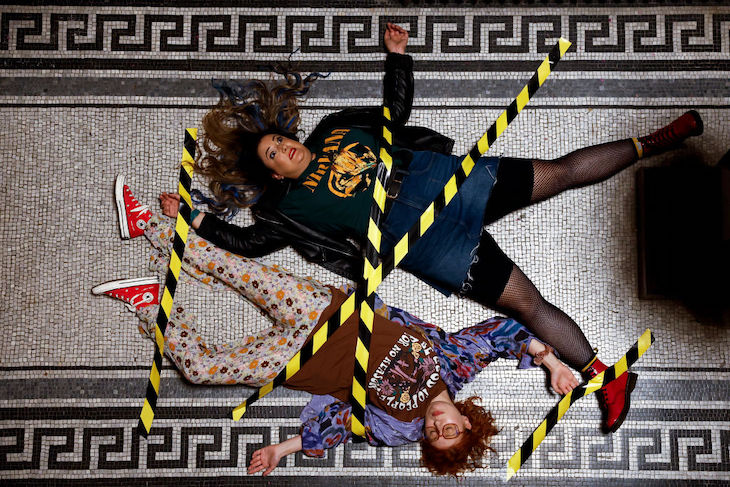The Edinburgh Festival is finally over, but why was this year’s event so obsessed with dying? Death is the new Black, at least according to the artists at the fringe where our mortality has been eviscerated, diced, disembowelled, deconstructed and fed back in a torrent of death shows to an army of avid theatre goers ever hungry, it seems, for new interpretations of our predictable demise.
Death Suits You, When We Died, You are All Going to Die, The Last Show Before We Die, Hello Kitty Must Die, and the Dead Dad Show are just a few of the catchy morbid show titles proudly performed in defiance of the usual theatrical sales logic that death is a stinker.
The official Edinburgh International Festival got in on the death act too, with the unremittingly grim National Changgeuk Company of Korea’s production of the Trojan Women, staged in Korean. During this bleak show, the last female survivors of Troy are told to willingly accept their future fate as slaves, concubines and play toys of their Greek conquerors after the murder of their husbands. ‘Anyone who claims to be happy before death is a damned fool,’ explains one of the subtitles.
There is far more death anxiety production to come
There were so many death shows that even Death on the Fringe, an outcrop of the Scottish Palliative Care Association, that normally curates a mini-death festival at Edinburgh has given up counting. ‘Undoubtedly Covid made us all think about death in a very different way. But it’s a mixed message. For some it’s: ‘We had two years of that and it’s enough’. But for others, artists and audiences, it’s something they want to explore, even if it’s just a stand-up show and a few jokes about dying. And it’s a tenner well spent,’ says organiser Mark Hazelwood.
Topping the fringe death-themed bill was Belgian director Alexander Devriendt’s sold-out Funeral show where, in a Covid-inducing rush of fear, audience members enacted out their allotted roles as mourners shaking hands with scores of their fellow ticket buyers as fellow bereaved call out the names of their own personal dead. Funeral’s symbolic but powerful evocation of loss and grief left many of its audience in tears.
More art installation than a conventional theatrical staging, Funeral was inspired by Devriendt’s father’s death and a sense of alienation in a God-disbelieving world. ‘I was so busy organising my father’s funeral that I did not have time to say goodbye. But I also saw that every funeral is a performance. Many of us don’t believe in God any longer but we still need rituals, their beauty, to make sense of our experience. We need to recognise and value them.’
Across the rest of the fringe, Death came in all shapes and forms. Sam Hooper’s Death Suits You was a musical comedy where Death, as the main character, berates the audience for failing to appreciate his true talents as the ultimate showstopper. He proudly boasts of the intricacy of the methods of dispatch, including the poor waitress who tripped and impaled her forehead on the food order docket spike.
A far darker but intriguing work, When We Died by Alexandra Donnachie, juxtaposed the intimate violation of the funeral embalmer’s mortuary slab with the main character’s revelation that the corpse was her rapist. In churning detail, we learn the secrets of the embalmer’s trade, from the insertion of spiky contact lenses to keep the eyes closed, alongside the devastating trauma of sexual assault.
‘Death is definitely a theme this year. Sometimes, it’s like I have a perfect audience. Just in total silence watching me. We don’t talk enough about death but my character, the embalmer, is very proud of her work. There is also the intimacy of the act of embalming, the contrast in his lack of consent to what she is now doing to him and her lack of consent about what he did to her,’ says Donnachie.
Edinburgh being Edinburgh, the legacy of the Enlightenment was never far beneath of surface as American playwright Duane Kelly explored the final hours and death thoughts of the 18th Century Scottish philosophers Adam Smith and David Hume. Enquiry Concerning Hereafter, magnificently staged in Smith’s own restored 18th century home Panmuire House, just off the Royal Mile, delved into the bedrock of our anxiety over dying once we have overcome our fear of a vengeful Creator. ‘If you take God off the table it makes many people unsettled, anxious, insecure and fearful. It also raises another big question. Then what is the basis of morality,’ says Duane Kelly.
Edwin Flay’s remarkable one man show Quality of Mercy explored the far more personal morality of England’s greatest mass murderer Dr Harold Shipman on the eve of his suicide in his prison cell. ‘I have the power of life and death. And I don’t believe in just letting them go on and suffer,’ says the avenging Shipman.
In the maelstrom of the fringe’s 3500 shows and millions of ticket sales finding any common artistic thread, even one themed around our common mortality, is all but impossible. But the sheer preponderance of death related material at this year’s fringe is proof that Covid-style death thoughts are never far away. And there is far more death anxiety production to come. Our Covid traumas are far from over. Death is indeed the new Black.
Kevin Toolis is the author of My Father’s Wake: How the Irish Teach Us to Live, Love and Die






Comments